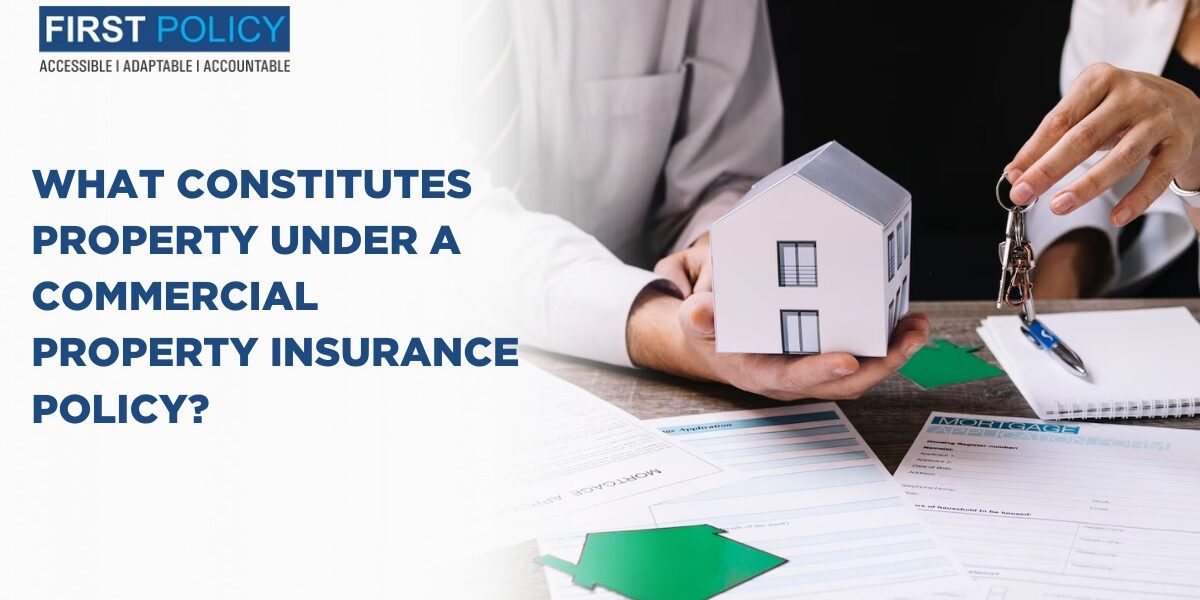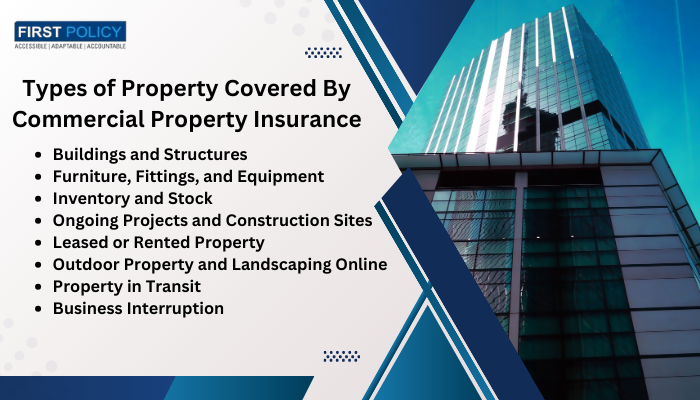
What Constitutes Property Under a Commercial Property Insurance Policy?
Risk management includes commercial property insurance, for businesses. So, it is a cover of the vital physical assets for the business operation helping to protect from possible financial losses. In order to properly insure your business under a commercial property insurance policy, it is important to know what constitutes property. This blog will cover what constitutes property under such policies, various types of property insurance, including types like warehouse insurance and construction all risk insurance.
What is Commercial Property Insurance?
Property insurance is an insurance policy that supplies monetary compensation to the owner or renter of a construction and its contents in the event of shed or theft. Commercial property insurance protects an extensive portfolio that includes any and all building and interests, machinery, inventory, furniture and equipment, and all other similarly situated property examples. It is intended to assist in rapid recovery from an unexpected event, with minimal disruptions to businesses’ down time and financial loss.
However, one of the most important questions that a business owner usually asks is: “What exactly is covered under a commercial property insurance policy?” But the answer is multifaceted, because the term property has many elements.
Types of Property Covered By Commercial Property Insurance

1. Buildings and Structures
Property covers the most obvious of property, physical building or structure where the business operates. Such as the main building, warehouses, storage facilities and any rest of the buildings that are permanent structures such as garages, sheds or whatever.
Warehouse Insurance
Warehouse insurance is important for businesses who use warehouses for storage. Valuable inventory and materials are being put into a warehouse which in itself is prone to a risk such as fire, theft, flooding etc or even an accident. Warehouse insurance is specific property insurance for the warehouse and the inventory located in the said warehouse. If good coverage is not mounted then damage to the warehouse can prove costly as it would mean to incur major losses.
Office buildings are generally immune to unique risk impacts experienced by warehouses. For example, warehouses are more likely prone to fire because of the size of materials stored in it may be flammable. Widely considered is theft, as warehouses tend to be the targets for the high value of goods stored therein. Such risks can be covered by a comprehensive warehouse insurance policy, and your business will be able to recover quickly from a disaster.
2. Furniture, Fittings, and Equipment
The contents of your building including furniture, fixtures and business equipment are also covered under commercial property insurance. This might be any office furniture, machinery, computers and even specialized equipment that’s needed for the running of the business each working day.
3. Inventory and Stock
The assets for a business that deals in goods consist primarily of the inventory. Inventory is often covered by property insurance policies and protects against risks like fire, theft, water damage, etc. Retail businesses, wholesalers, and manufacturers need this coverage especially.
With so much stock managed in warehouses, warehouse insurance is important in e-commerce and wholesale distribution industries only. It makes sure that the inventory stored in these facilities is protected by the policy, from potentially devastating losses.
4. Ongoing Projects and Construction Sites.
Construction sites and ongoing projects are one area that is sometimes overlooked in the discussions on property insurance. Buildings being constructed are very susceptible to different risks such as fire, vandalism/theft, and natural disasters. Construction all risk insurance comes in here.
Construction All Risk Insurance
All risk insurance for construction covers building and infrastructure projects through their construction. It covers numerous types of risks, including damage to the building on which construction is in the process of being undertaken and loss of material and equipment on the construction site. Construction all risk insurance is important very important to any construction company, contractors or even developers.
Construction all risk insurance is especially beneficial because it provides complete coverage for bodily injury and property damage from third party claims. It’s important because construction sites are inherently dangerous and accidents do happen no matter how careful you are. Having construction all risk insurance gives you protection of all that liabilities.
5. Leased or Rented Property
A lot of businesses are operating out of leased and rented spaces. The policy may or may not include coverage for leased or rented property, and commercial property insurance can. This protects you in case the rented property was damaged and the damage wasn’t caused by the tenant’s negligence. It is very important for an organization whose business space is inside a warehouse, retail establishment or an office building owned by someone different from them.
For instance, warehouse insurance can cover your contents even if the warehouse itself ‘s not yours, if you’re leasing the building, for instance. Also, the leased property’s alterations or improvements from time to time, for instance, installing new shelving, lighting, or other needed appurtenances, may be part of the policy.
6. Outdoor Property and Landscaping Online
A commercial property insurance policy can be often overlooked since often overlooked are to include outdoor property such as fences, signs, landscaping, etc. Although these aren’t the types of things that immediately come to mind when you think about insurable assets, if these items are damaged they can be a costly affair. The first is really important to businesses that depend upon signs and fixtures on their properties.
Let’s say something like a large outdoor sign is destroyed by a storm that is basically crucial to getting customers, the loss could really hurt the business. Businesses can be freed from financial stress from sudden damage to property in business insurance that covers such outdoor assets.
7. Property in Transit
The property insurance that is mentioned also covers property in transit. Wholesalers, manufacturers, distributors and other businesses that transport goods or equipment from one location to another regularly risk losing valuable property in transit. This risk is normally mitigated by taking all risk construction insurance during projects or warehouse insurance for storage goods, some policies also insure goods in transit.
Thus, commercial property insurance gives you compensation in case the goods are destroyed or stolen in transit, for example, if goods are being transported from a warehouse to the spot of a construction and get damaged or stolen during this process. Transportation Insurance offers a form of coverage that guarantees businesses won’t financially suffer as a result of transportation related risk.
8. Business Interruption
Business interruption coverage is sometimes included as not a physical ‘property’, but rather a ‘property’ of commercial property insurance policies. Such coverage helps a business make up for lost income and extra expenses incurred during the time that the business cannot usefully operate because of a covered peril, like a fire or flood.
However, businesses with operations that are vital in nature and require physical presence to make them function, such as warehouses or construction sites, need business interruption coverage the most. Business interruption coverage is in place in case a warehouse is damaged by fire, halting the supply chain, or in the case of a halt to a construction site in the face of a natural disaster.
Why You Should Customize Your Property Insurance Policy
While the risks of any business are not exactly the same, you need to customize your property insurance policy to match your needs. For example, if you work in a warehouse, then you require specialized warehouse insurance that protects the building and the value bequeathed within. Likewise, if you’re a construction contractor you will need construction all risk insurance to cover your ongoing projects.
In specialized industries, a standard generic property insurance policy may not be all that is needed. The policy tailoring makes sure that every specific part of your business’ physical assets/property (regardless how tangible) is in the policy – from the office furniture to the inventory held in storage, to the building on the construction.
Working with a Qualified Broker
Navigating the intricacies of commercial property insurance can really be helped by working with an insurance broker who specializes in your industry. A broker can help you make sure you have the right insurance to cover yourself in such areas as construction all risk insurance, warehouse insurance or general property insurance, and all other types of risks you might encounter.
Conclusion
Not surprisingly, commercial property insurance is important and right for any size business. It protects the physical assets of a business, for things such a buildings, furniture, inventory and construction projects. If you’re running a warehouse or working on large scale construction projects, having the specialized coverage warehouse insurance and construction all risk insurance will protect your business against the unexpected.
Business owners can secure the coverage that will meet their specific needs by understanding the terms under which property is included under a commercial property insurance policy. Business continuity is provided by adequate coverage not only to protect physical assets but also to enable the swift recovery from unforeseen events that could otherwise disrupt business operations.





